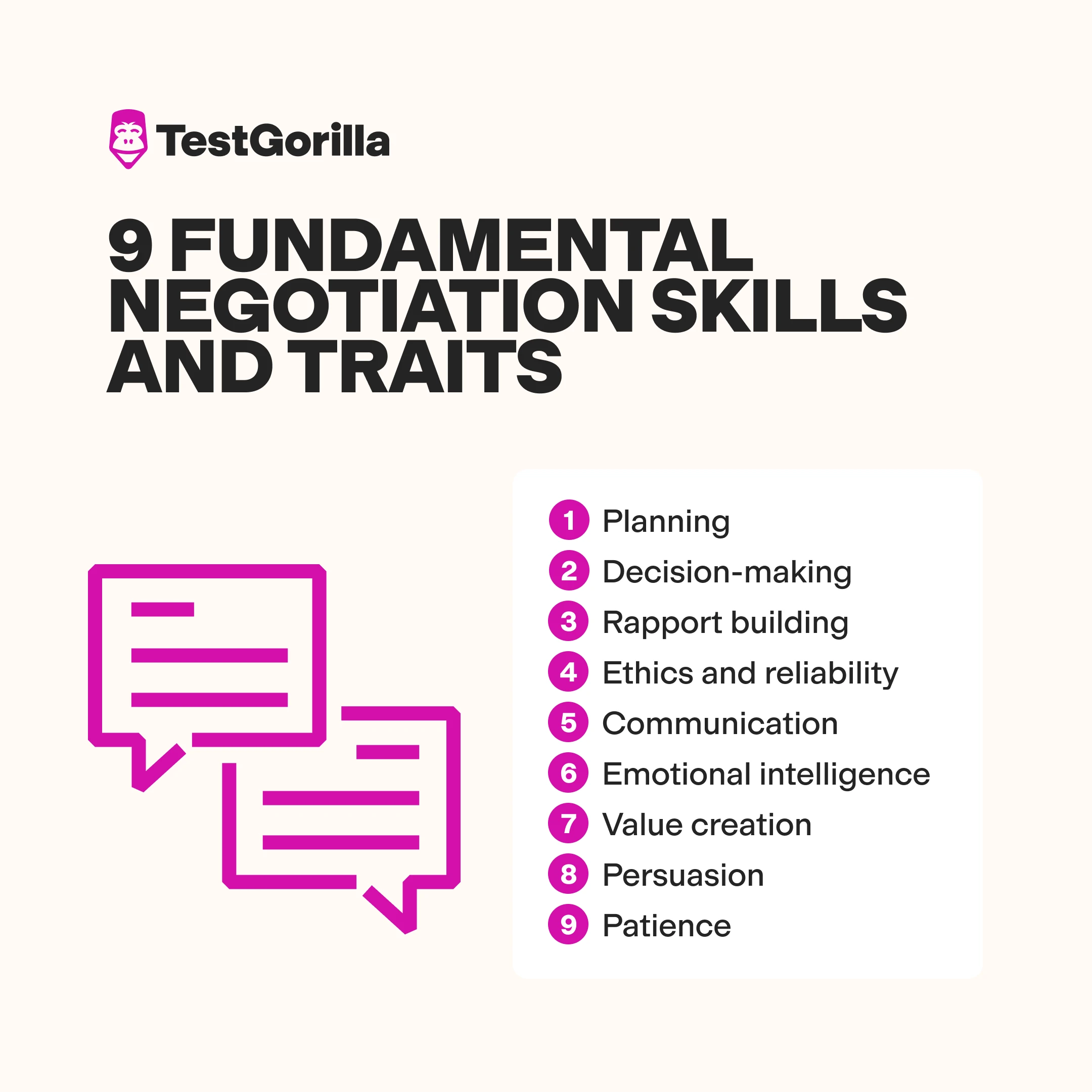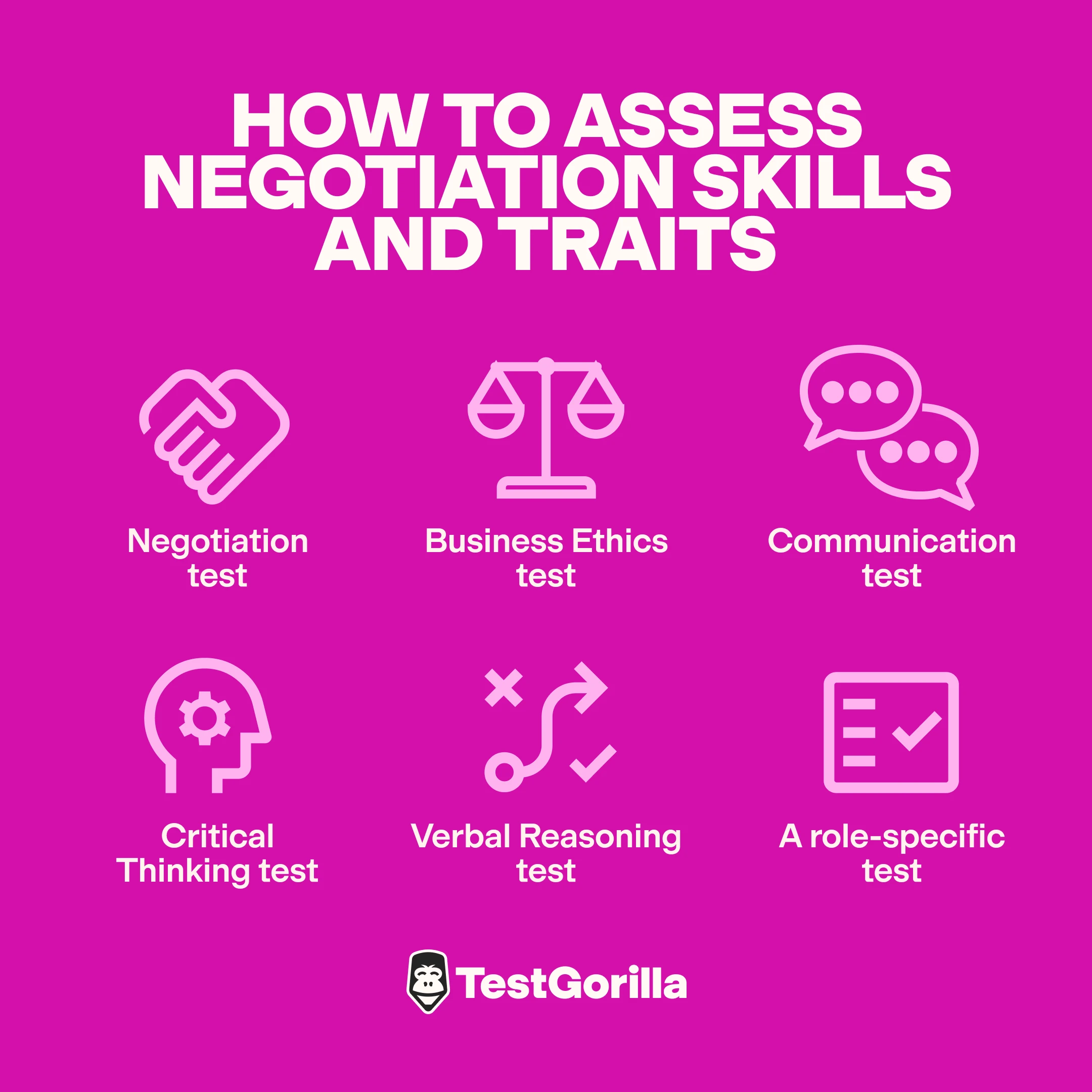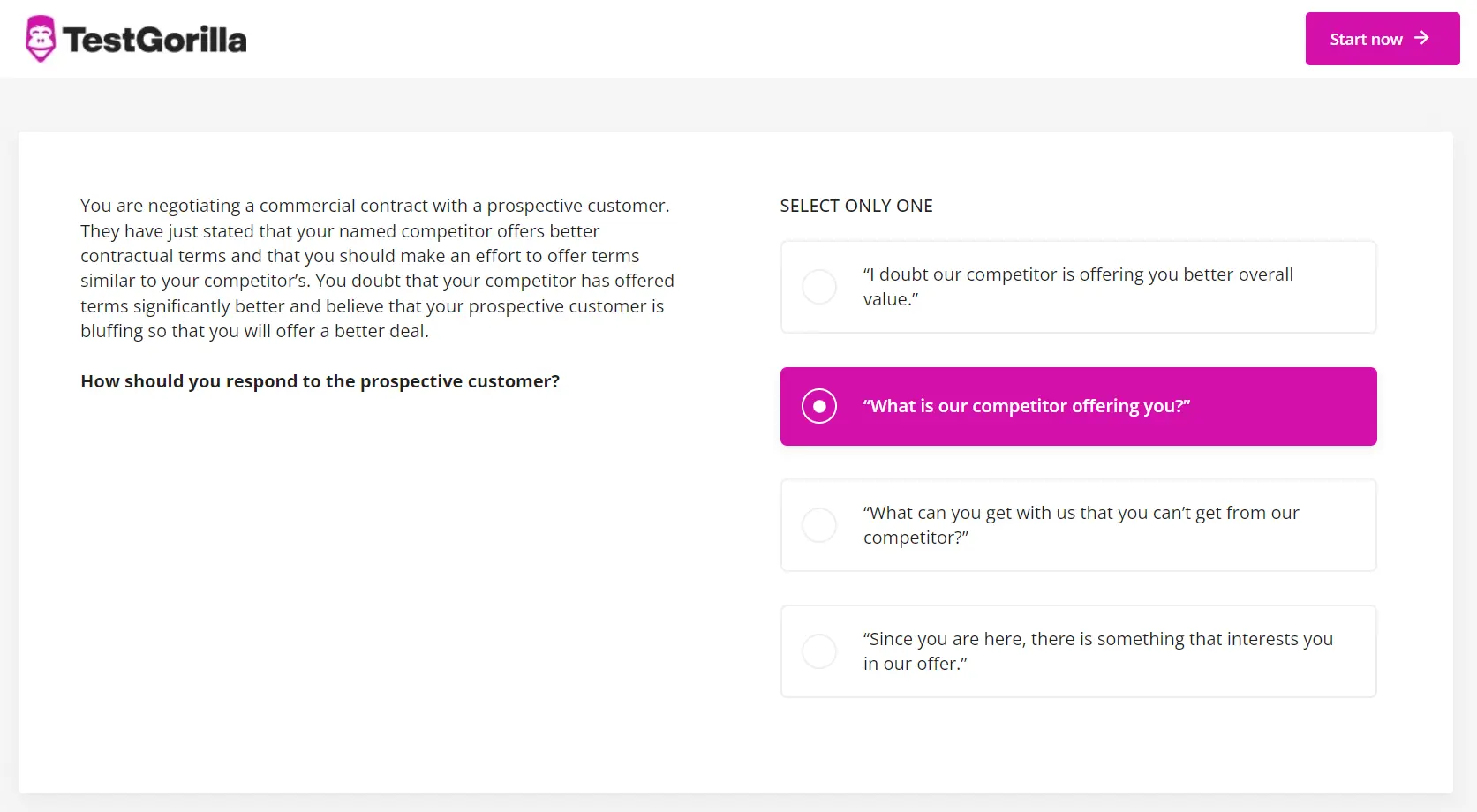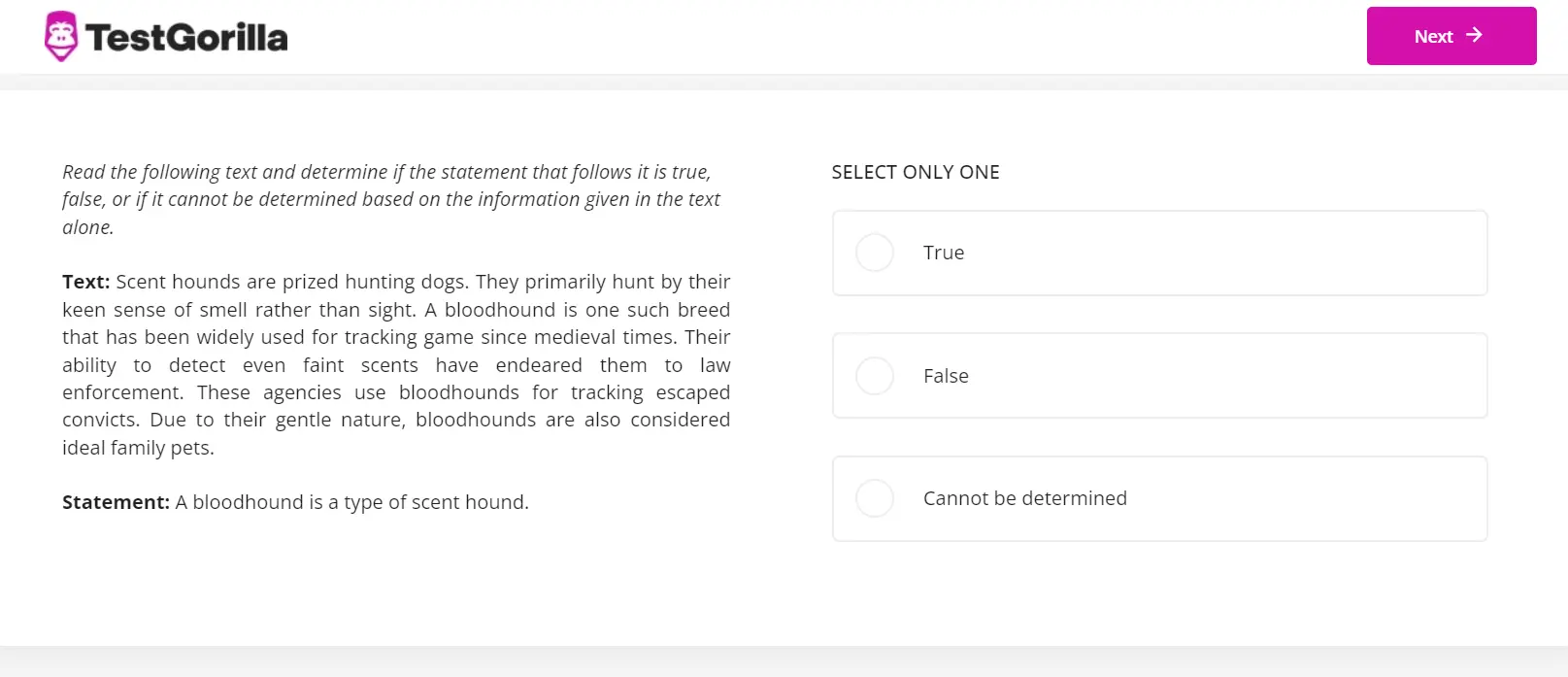9 key negotiation skills (and how to assess them)
Gauge top negotiation skills with talent assessments
Negotiation skills are one of the pillars of a high-performing workforce. Whether it’s closing a lucrative deal or resolving conflicts in the team, the art of negotiation is indispensable.
You need to hire people who bring effective negotiation skills to the table – and resumes can’t find them.
Let’s look at nine negotiating skills useful for difficult conversations and constructive interactions. We also discuss talent assessments, which are the best way to evaluate and build these vital skills.
Table of contents
9 fundamental negotiation skills and traits
Both aspiring contractor negotiators and HR professionals looking to hire new salespeople need to look out for negotiating skills.
Globally, about 50% of job applicants in the learning and development industry consider their negotiation skills essential. This broad umbrella encompasses many types of negotiation skills, including planning, emotional intelligence, and active listening.
Negotiation tactics include everything from body language to listening skills. Different negotiation styles, like counter offers at the bargaining table, are needed to reach common ground and a desirable outcome.
Remember that although the negotiation skills you require vary depending on many factors (i.e., your industry and workplace culture), the importance of negotiation makes it a vital employee skill for nearly every role.
1. Planning
Planning is one of the most important negotiation strategies when it comes to a business deal. Having a clear idea of what you hope to achieve from the negotiation dictates every action you take, so thorough preparation is a must.
Inadequate preparation may result in harmful oversights that damage the conversation and reduce the chance of a win-win outcome. For example, an HR professional needs to know the exact salary range of a position to negotiate potential pay for a new employee effectively.
Setting goals for each negotiation can help you develop strong planning skills. A structured negotiation with measurable goals keeps you focused on the task at hand and naturally enhances your planning abilities.
2. Decision-making
A top negotiator must make decisions in a limited time frame. They must be able to identify a good compromise and decide if it’s in the best interest of your organization.
Good decision-making means considering your options carefully without dragging out the conversation or overthinking things.
It’s one of the negotiation skills techniques that carries a lot of weight because each decision in a negotiation has lasting effects on your company.
Learning how to improve negotiation skills like decision-making involves balancing your intuition with critical analysis and keeping the company’s best interests top-of-mind.
3. Rapport building
Effective negotiation skills must include building relationships and rapport in your personal life and business. This ability facilitates cooperative agreements and sets the stage for positive future interactions. Returning to the negotiation table on good terms is essential for lasting partnerships.
Negotiating is first and foremost about people; 82% of sales professionals say building relationships and connecting with people is the most important part of selling and negotiating – and the most enjoyable.
Rapport building establishes a relationship between the parties involved, making them feel supported and understood. It also helps ease tensions and promotes collaboration.
4. Ethics and reliability
Trust forms the bedrock of successful negotiations, and it’s built on ethics and reliability. Negotiation experts maintain high ethical standards – they’re truthful, fair, and transparent in their dealings.
People need a negotiator to show integrity and reliability, follow through on commitments, and uphold their end of the agreement. This trust leads to better negotiation outcomes in future discussions.
Learning how to develop negotiation skills like ethics means recognizing inherent integrity, a soft skill, and working to build business ethics, a hard skill that can grow through experience and coaching.
5. Communication
People with great workplace communication skills engage in productive discussions, helping ensure they walk away from the negotiation satisfied.
Nothing is non-negotiable, and when you communicate the right way, you can make a first offer that opens the conversation. Effective communication breaks down into three separate types of negotiation skills:
Verbal communication
Non-verbal cues
Active listening
All three of these skills contribute to your ability to express ideas, further the organization’s interests, and avoid misunderstandings that hinder compromise and progress.
Active listening is particularly important. A skilled negotiator shows genuine interest in what others say, asks insightful questions, and makes people feel heard and understood to build trust.
6. Emotional intelligence
Managing your emotions while recognizing the feelings of others is essential. A keen awareness of the emotional dynamics involved in negotiation helps you steer a negotiation process toward resolving the core issues.
The bottom line is that emotional intelligence is key to great discussions and long-term partnerships. Aggressive tactics can get satisfactory short-term results but reduce long-term relationships and trust.
Negotiators with high emotional intelligence have a distinct advantage. This skill enables them to remain composed and make rational decisions – even in the face of intense emotions.
7. Value creation
Another core negotiating skill to consider is balancing needs on both sides – bringing value in exchange for value.
When you find unique solutions to problems, you realize greater value from the negotiation.
This skill involves understanding and anticipating the other parties' needs while considering your own. Good negotiators know that these discussions should always be win-win, with all parties walking away satisfied.
8. Persuasion
Influencing others is indispensable for successful business negotiations. This quality complements and underpins all the other negotiation skills – if you can’t persuade other parties, you struggle to uphold your company’s interests.
A persuasive negotiator can defend your solution during dialogue and encourage the parties to acknowledge and support their ideas. In other words – essential negotiation skills and techniques like persuasion help others see your point of view, not just reluctantly agree.
Charisma and ambition have a significant impact on the effectiveness of a negotiation, so develop your persuasion skills with keen attention to your confidence, maintaining respectful assertiveness and a firm knowledge of your needs.
A negotiator must come to each discussion prepared and ready to display authority.
9. Patience
Savvy negotiators understand that reaching an agreement can take time, so they don’t rush into decisions. Instead, they let the negotiation process unfold naturally, providing all parties ample time to express their viewpoints.
Patience is essential to discuss important terms slowly, keeping all parties calm and satisfied. This patience enables them to avoid impulsive decisions and work towards a mutually beneficial agreement.
How to develop negotiation skills: 6 tips
Because of negotiation's importance, even seasoned professionals take the time to hone their skills, practicing new techniques with colleagues and reflecting on past discussions.
Learning how to improve negotiation skills isn’t difficult, and there are many ways to do it.
Method | Description |
1. Practice with colleagues | Create scenarios and use simulations and role-playing with colleagues and mentors to test negotiating skills and new techniques. |
2. Steadily build confidence | Build a comfortable, respectful authority to help others trust ideas and solutions. |
3. Consider professional development opportunities | Pursue negotiation training, classes, and workshops to hone negotiation abilities. Managers who take professional negotiation courses feel more proficient in communication, confidence, and conflict management. |
4. Reflect on past negotiations | Consider and examine past discussions. Think about what could have gone better and what to do differently next time. |
5. Hone your hard skills | Build learnable skills like business ethics, planning, and decision-making. While much negotiation is based on soft skills, paying attention to these hard skills makes a huge difference. |
6. Monitor development with talent assessments | Discover baseline communication and negotiation skills by self-evaluating with talent assessments. Throughout development, periodically reassess to monitor progress. |
How to assess negotiation skills and traits: 5 skills tests
You need an accurate, reliable way to gauge effective negotiation skills – these abilities are nuanced and can’t be displayed in a resume.
Talent assessments are the best way to assess negotiation skills. A skills-based hiring process lets you land talent that leaps off the page and into action.
Skills tests help you discover real skills, reduce bias, and encourage diversity. Empowering women negotiators is good for your business.
Learn how to build a complete talent assessment with our product tour.
Let’s look at five essential tests for evaluating negotiating skills, plus one bonus test for role-specific skills.
Negotiation test
Our Negotiation test evaluates candidates’ comprehension and application of negotiation principles. It measures their ability to negotiate in a business context, achieve results, and close favorable deals.
It gauges vital contract negotiation skills like:
Driving and directing conversations
Influencing others
Taking advantage of the psychology of other parties
Check out even more negotiation skills examples in our sample questions.
This test discovers candidates who ensure that negotiations are win-win and all parties are satisfied, focusing on objective criteria and mutual interests. It also gauges an individual’s ability to separate a person from a problem and maintain excellent rapport.
Business Ethics test
Our Business Ethics test evaluates a candidate’s skills in adhering to company policies and understanding how their behavior impacts internal and external situations.
Identifying strong business ethics ensures your new negotiator can avoid conflicts of interest, understand potential policy violations, and spot possible issues affecting the company’s reputation.
For example, an HR professional who scores highly on our Business Ethics test can tactfully negotiate contract terms when hiring a freelance graphic designer while keeping company contractor policies in mind.
Communication test
Our Communication test measures a candidate’s ability to articulate their thoughts, understand others, and maintain professional etiquette in all forms of communication. It considers non-verbal cues and active listening, which are key elements in negotiation.
Solid Solutions Management, an engineering design software company, uses talent assessments to gauge communication, problem-solving, and ethics. It believes these soft skills are nearly more important than technical skills.
High-scoring candidates display clarity in their speech, show solid conflict resolution, and use professional communication etiquette.
Critical Thinking test
Our Critical Thinking test assesses a candidate’s ability to think logically and make sound decisions. Negotiations often involve situations where information is ambiguous. Good negotiators need to analyze such information objectively and make reasoned judgments.
This test gauges how candidates:
Weigh arguments
Recognize assumptions and bias
Analyze information
Interpret sequences
Draw sound conclusions
The ability to weigh complicated situations empowers negotiators to make the best decision for your company. For example, a supply manager with keen critical thinking buys a product at a higher price because they realize the value it brings to the business.
Incorporating this test into your hiring process can equip your team with critical thinkers who navigate complex discussions effectively.
Verbal Reasoning test
The Verbal Reasoning test evaluates a person’s ability to understand and analyze written and spoken information. It also shows you how someone draws logical conclusions and communicates their ideas.
Clear and persuasive communication is crucial in negotiation. Individuals must comprehend and interpret verbal cues, understand the underlying meaning behind statements, and effectively articulate their thoughts and positions.
Our test discovers candidates who:
Grasp complex information
Identify potential conflicts or misunderstandings
Respond appropriately with well-reasoned arguments
Experts in verbal reasoning construct coherent and logical arguments, anticipate counterarguments, and adapt their communication styles to different audiences.
Bonus assessment: A role-specific test
You aren’t hiring a “negotiator” – you’re looking for specific positions, including salespeople, HR professionals, sales associates, and project managers – so let’s look at a few role-specific tests.
We recommend building a talent assessment with five tests. Use four of the above types of negotiation skills tests, and then add a role-specific test to customize the assessment to your position.
Here’s an example assessment for an estate agency sales negotiator:
Negotiation test: Gauges how to close deals and achieve results
Verbal Reasoning test: Measures how to communicate ideas and understand others
Critical Thinking test: Evaluates the ability to analyze information and make decisions
Business Ethics test: Assesses how someone upholds company policies and interests
Salesforce CRM test: Gauges a candidate’s proficiency in using Salesforce CRM
This five-test assessment measures critical negotiating skills, like business ethics and verbal reasoning, and gauges the essential role-specific ability to use Salesforce CRM.
Another example is hiring a program manager, a role where negotiation skills help determine project resources, team member salaries, and the overall budget.
Use the above negotiation tests with our Program Management test to assess stakeholder and project lifecycle management skills alongside effective negotiation skills.
Get started today and build your first complete talent assessment with our free forever plan.
Summary: The 9 key negotiation skills and how to test for them
Negotiation skills | Description |
1. Planning | Determines a candidate’s ability to organize and prioritize the company’s interests before entering a negotiation |
2. Decision making | Assesses how someone considers offers and options and makes sound decisions without overthinking |
3. Rapport building | Evaluates how a candidate builds rapport and maintains relationships with negotiation parties |
4. Ethics and reliability | Measures the fairness and trustworthiness of a candidate and how they follow through on commitments |
5. Communication | Gauges a candidate’s written and verbal communication, active listening, and ability to interpret non-verbal cues |
6. Emotional intelligence | Measures how a candidate understands the needs and emotions of others |
7. Value creation | Evaluates how an individual anticipates and understands the needs of other parties |
8. Persuasion | Gauges the confidence and charm that a candidate has and how they direct others to see their point of view |
9. Patience | Measure how calmly and patiently a candidate communicates and comes to a satisfying solution |
Assess and hire the best negotiators with TestGorilla
The ability to control, drive, and influence a discussion leads your company to better outcomes, and the right persuasion and emotional intelligence ensure you maintain positive partnerships for years to come.
Negotiation skills are essential for countless roles, but they don’t show up on paper. Talent assessments uncover the skills beneath the surface – see for yourself by signing up for a free forever account.
Or get an in-depth look at the possibilities of talent assessments by booking a demo with one of our experts.
Negotiation skills FAQs
Let’s wrap this up by answering a few frequently asked questions about negotiation skills.
Why are negotiation skills important?
Negotiation skills help professionals mediate conflict, offer solutions, solve problems, and build better relationships. Experienced negotiators foster an environment of cooperation, encourage open dialogue, and promote mutual respect. These skills also help negotiators reduce business costs, win important clients, and give companies a competitive advantage.
Expert negotiators strategize with their company’s interests in mind, enhancing cooperation, nurturing partnerships, and balancing value.
What are the benefits of negotiation?
Fosters better relationships and prevents conflict
Delivers satisfying solutions to simple or complex disputes
Mitigates future issues and conflicts
Balances interests on every side
Maintains ethics and compliance
Reduces costs by keeping your company needs top-of-mind
Enhances company reputation
Saves trouble and money
Who needs negotiation skills?
Sales professionals and community organizers
Lawyers and real estate agents
Diplomats, negotiators, and career politicians
Product managers and sales representatives
Right-of-way agents
Project managers
Human resource professionals
Contract negotiators and entertainment agents
Executives like human resources directors and vice presidents of sales
What are the 5 negotiation techniques?
The main five negotiation skills techniques are compromising, leading, persuading, active listening, and accommodating. These tactics enable negotiators to see things from different perspectives, consider the other party’s needs, and uphold the interests of their organization. Expert negotiators often use assertive strategies in small amounts, opting for a collaborative approach.
Another important negotiation technique is knowing your best alternative to a negotiated agreement (BATNA). Your BATNA is the value your party requires to walk away from an agreement. In other words, it’s the least value you accept before leaving a negotiation.
What are the 5 rules of negotiation?
Prepare and plan, knowing in advance your needs and limits
Focus on building rapport, relationships, and trust
Remain adaptable and willing to compromise to find a solution
Listen actively and ask relevant questions
Maintain firm control and direct the discussion
Related posts
Hire the best candidates with TestGorilla
Create pre-employment assessments in minutes to screen candidates, save time, and hire the best talent.
Latest posts
The best advice in pre-employment testing, in your inbox.
No spam. Unsubscribe at any time.

Hire the best. No bias. No stress.
Our screening tests identify the best candidates and make your hiring decisions faster, easier, and bias-free.
Free resources
This checklist covers key features you should look for when choosing a skills testing platform
This resource will help you develop an onboarding checklist for new hires.
How to assess your candidates' attention to detail.
Learn how to get human resources certified through HRCI or SHRM.
Learn how you can improve the level of talent at your company.
Learn how CapitalT reduced hiring bias with online skills assessments.
Learn how to make the resume process more efficient and more effective.
Improve your hiring strategy with these 7 critical recruitment metrics.
Learn how Sukhi decreased time spent reviewing resumes by 83%!
Hire more efficiently with these hacks that 99% of recruiters aren't using.
Make a business case for diversity and inclusion initiatives with this data.























